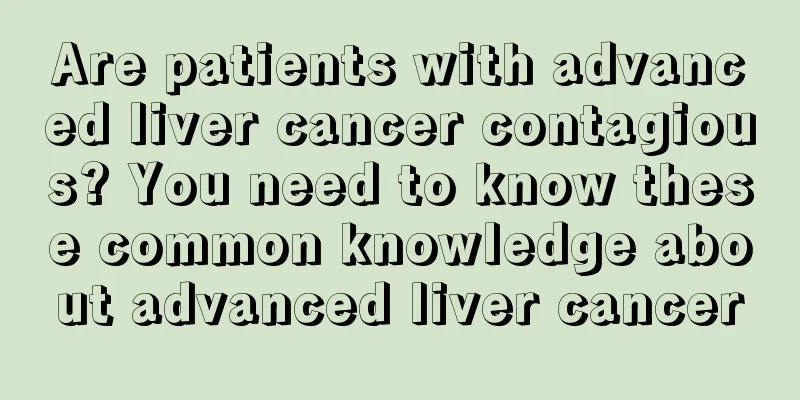Are patients with advanced liver cancer contagious? You need to know these common knowledge about advanced liver cancer

|
Liver cancer is a common disease in daily life. The causes of liver cancer are very complicated. Liver cancer patients should pay attention to a lot of daily care work, which is conducive to improving their confidence and courage to face liver cancer. Will advanced liver cancer symptoms be contagious? Will patients with advanced liver cancer be contagious? Let's have a simple understanding and understanding of this issue. I hope the following points will be of some help! According to statistics, 95% of liver cancer patients have hepatitis, and hepatitis is contagious. Therefore, it is not difficult to guess that if one person in a family has hepatitis and the others do not take protective measures, they are likely to be infected. Because hepatitis is contagious, many people think that liver cancer is also contagious. In fact, not all liver and gallbladder diseases are contagious, and liver cancer is not. Liver cancer is not contagious, does not meet the conditions for infection, has no pathogens, and has no susceptible population. Although liver cancer has a family clustering phenomenon, it is not caused by infection, but by genetic inheritance, mutual living conditions and other reasons. Liver cancer itself is not directly contagious. The occurrence of liver cancer is closely related to infectious diseases such as hepatitis B and hepatitis C. If the patient has viral hepatitis and is converted to hepatitis B, he may be infected during the viral hepatitis stage. Liver cancer is also accompanied by active hepatitis, so it is contagious. The cause of infection is hepatitis, not liver cancer. Liver cancer itself is not contagious. However, the hepatitis that causes liver cancer symptoms is highly contagious. Therefore, once you have hepatitis, you need to seek medical treatment in time, and the patient's relatives should also pay attention and take protective measures to avoid infection. Hepatocellular carcinoma is a non-infectious disease. Most liver cancers in China occur on the basis of hepatitis B or hepatitis C. Neither hepatitis B nor hepatitis C has been properly treated. After hepatitis and cirrhosis occur, liver cancer eventually develops. Although HCC is not contagious, its underlying disease is contagious, which leads some patients to mistakenly believe that HCC is contagious. Therefore, if liver cancer patients have hepatitis B or hepatitis C, they should avoid direct blood and blood contact with patients to prevent infection. |
>>: How to prevent liver cancer? Liver cancer patients need to do these 4 steps
Recommend
Can lemon and coffee be drunk together
Lemon is a relatively sour fruit and is often use...
Why does my skin turn darker even without sun exposure
Everyone's skin quality is different. Some pe...
How to pickle garlic with soy sauce
If people in the north know this, they will know ...
What to do if you feel sick and nauseous after eating
When eating, if you eat too much greasy food, it ...
Causes of chills and high fever in gallbladder cancer
There are no specific clinical manifestations in ...
How often should I wash my underwear?
Bad living habits can lead to symptoms of physica...
Is runny nose caused by wind-cold or wind-heat?
The symptoms of clear runny nose usually appear i...
What is the difference between bone metastasis pain and ordinary pain?
Bone metastasis refers to the cancer cells of mal...
9 ways to diagnose lung cancer
In addition to typical clinical manifestations, t...
Surgery is the main treatment for skin cancer
For most cancers, such as skin cancer, surgery is...
Squeezing pimples hurts the surrounding skin
Getting pimples on the face is the most annoying ...
Which acupoints should be massaged for excessive liver fire? The three major acupoints can calm liver fire
In this relatively dry season, many people may ex...
What are the factors that cause colon cancer
You may not know much about colon cancer. It is n...
What are the symptoms of dry mouth and throat
Dry mouth is a common symptom. People may experie...
What are the foods with the lowest calories
Many people have obesity problems, mainly because...









